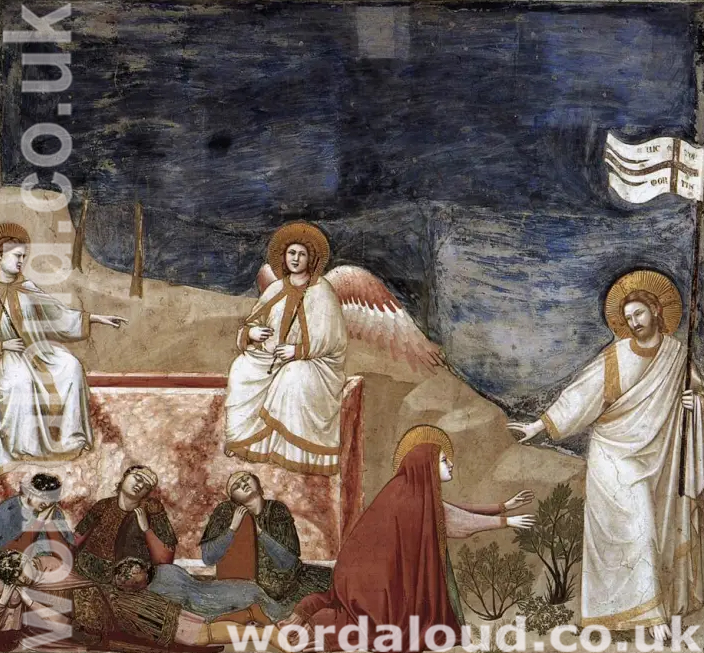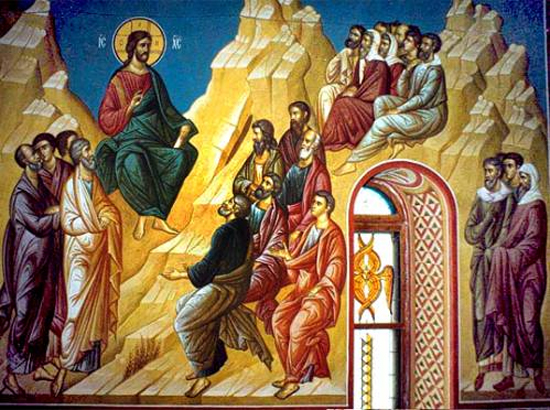Christian Art | Tradition Of The Elders | Ritual Cleaning
Mark 7: 1-8, 14-15, 21-23 – 22nd Sunday Year B (Audio Bible KJV, Spoken Word)
1 THEN came together unto him the Pharisees, and certain of the scribes, which came from Jerusalem.
2 And when they saw some of his disciples eat bread with defiled, that is to say, with unwashen, hands, they found fault.
3 For the Pharisees, and all the Jews, except they wash their hands oft, eat not, holding the tradition of the elders.
4 And when they come from the market, except they wash, they eat not. And many other things there be, which they have received to hold, as the washing of cups, and pots, brasen vessels, and of tables.
5 Then the Pharisees and scribes asked him, Why walk not thy disciples according to the tradition of the elders, but eat bread with unwashen hands?
6 He answered and said unto them, Well hath Esaias prophesied of you hypocrites, as it is written, This people honoureth me with their lips, but their heart is far from me.
7 Howbeit in vain do they worship me, teaching for doctrines the commandments of men.
8 For laying aside the commandment of God, ye hold the tradition of men, as the washing of pots and cups: and many other such like things ye do.
14 ¶ And when he had called all the people unto him, he said unto them, Hearken unto me every one of you, and understand:
15 There is nothing from without a man, that entering into him can defile him: but the things which come out of him, those are they that defile the man.
21 For from within, out of the heart of men, proceed evil thoughts, adulteries, fornications, murders,
22 Thefts, covetousness, wickedness, deceit, lasciviousness, an evil eye, blasphemy, pride, foolishness:
23 All these evil things come from within, and defile the man.
The purification rituals of the Jews were originally laid down, in Exodus, for the priests to perform before they offered sacrifices to God. These rules were then later extended to all Jews, to be performed before every meal. This was as there developed a greater and greater call for all Jews to be a priestly people, particularly in the light of national set-backs, which were ascribed to infidelities to God.
The washing is not considered as being primarily for reasons of hygiene. Rather it signifies as it enacts a spiritual purification, the sense being that all meals are to be accorded a religious significance. This is a blessing before a meal. And now we retain this practice, thanking God for the food we have received, asking God to bless this satisfying of among our most fundamental human needs – both for the food, and for the family and friends we are eating with – and treating a meal as a daily opportunity to offer our lives anew to God.
In church celebrations also we retain this tradition and its key significance, as the priest washes his hands, asking God to wash him clean of his sins, of his iniquities.
The Pharisees and scribes, so Jesus teaches us, have fallen away from the true spiritual meaning of this aspect of the law. They observe the traditions of the elders – and St Mark helpfully explains what these traditions were to what would have been a largely Gentile audience and readership – and yet theirs is a hollow observance. Nowadays, we call this ‘lip service’, and we say that a person acts ‘half-heartedly’, or we say, ‘His heart wasn’t in it.’ The Pharisees’ hearts aren’t in it. Theirs is lip service. So says our Lord. They do not follow the deep truth of the commandment of God; theirs is a merely human tradition.
Now Jesus confronts us, shockingly, with a new truth, which forces us to a real confrontation with the true law of God. Once again, Jesus overturns what we think we know, to get us really alert to the reality of our spiritual lives. It is what is in our hearts that matters. It is in the imagination of man that there may be good or evil. It is within ourselves that we have the choice to be with God or to fall to evil.
Never mind what goes into your mouths, so says Jesus: you concern yourself with what comes out. Never mind washing your hands; you make sure those hands do no evil, only good. The dietary laws of the Jews are done away with, for the Gentiles’ sake. And far, far more than that, we are taught about following our conscience, in the light of our full knowledge of the core of God’s commandments as to how we must live our lives.
‘“By God’s grace,” as the apostle says, “we have been saved, not because of works, lest any man should boast; for by his grace you have been saved.” There was no previous virtuous life which God could cherish and love from on high, so as to say: “Let us help and succour these men, for they are living a good life.” Our life was displeasing to him.’ St Augustine
Audio Bible KJV | Endnotes
Tradition Of The Elders
Mark 7:1-23 is a powerful passage that speaks to the importance of understanding the true nature of religion and spirituality. In this passage, Jesus is confronted by the Pharisees and scribes, who are questioning him about why his disciples do not follow the ‘tradition of the elders’.
The ‘tradition of the elders’ was a set of customs and practices that had been passed down through generations of Jewish leaders. These practices were seen as essential for maintaining purity and holiness, and the Pharisees and scribes were known for their strict adherence to these traditions.
However, Jesus challenges the Pharisees and scribes, stating that they have elevated their own traditions above the word of God. Jesus says: ‘Well hath Esaias prophesied of you hypocrites, as it is written, This people honoureth me with their lips, but their heart is far from me. Howbeit in vain do they worship me, teaching for doctrines the commandments of men.’ (Mark 7:6-7)
Jesus goes on to explain that true spirituality and religion is not about following a set of external rituals or traditions, but rather about cultivating a pure heart and a deep connection with God. Jesus says: ‘For from within, out of the heart of men, proceed evil thoughts, adulteries, fornications, murders, Thefts, covetousness, wickedness, deceit, lasciviousness, an evil eye, blasphemy, pride, foolishness: All these evil things come from within, and defile the man.’ (Mark 7:21-23)
The Gospel has been interpreted in many ways throughout history, and has been used to support a variety of religious and spiritual beliefs. Some have seen it as a call to reject all traditions and embrace a more personal, individualized spirituality. Others have used it to criticize religious leaders who prioritize their own traditions over the teachings of God.
One striking interpretation is from Martin Luther, the 16th Century German theologian and leader of the Protestant Reformation. Luther saw the Pharisees and scribes as representative of the Catholic Church, which Luther saw as corrupt and in need of reform. Luther argued that the Catholic Church had elevated its own traditions and rituals above the teachings of the Bible, and that this had led to a widespread spiritual corruption.
Luther wrote: ‘Christ’s words apply also to our time, to the extent that the pope and his followers permit human traditions to be counted among the divine commands and insist upon their observance, as though they were necessary for salvation.’ (Luther’s Works, vol. 35, p. 155)
This interpretation has been controversial, and has been criticized by many Catholics and other religious authorities. However, we can say that this interpretation of the Gospel speaks to the power and relevance of Mark 7:1-23, which continues to challenge and inspire people of all faiths to examine their own beliefs and practices, and to strive for a deeper connection with God.








